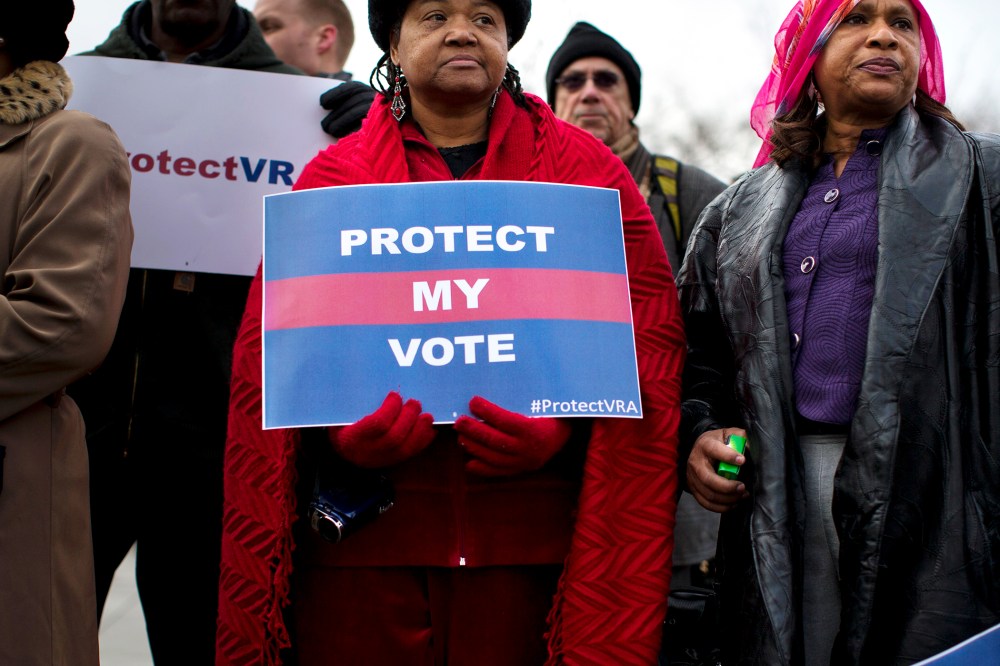Since the Supreme Court badly weakened the Voting Rights Act (VRA) a year ago, on June 25, 2013, states across the south and beyond have taken a barrage of steps to make it harder for racial minorities to cast a ballot—and in some places have already been successful. But despite an all-out push from voting rights advocates, the effort to fix the law is stalled in Congress.
The upshot: This fall’s midterms will likely be the first national elections in nearly half a century in which voters of color can’t rely on the full protections of the most effective civil rights law in U.S. history. And for some, a right that Americans have fought and died for could be in jeopardy, say advocates of a strong Voting Rights Act.
In Shelby County v. Holder, the Supreme Court invalidated a key VRA provision known as Section 5, which required certain “covered” areas with a history of racial discrimination—mostly in the south—to get federal approval before making changes to their voting systems. The Justice Department or the courts could block such changes if they threatened minority voting rights.
On Wednesday, a year to the day since the ruling, the Senate Judiciary Committee will hold a hearing on bipartisan legislation known as the Voting Rights Act Amendment (VRAA) aimed at restoring Section 5. In a bid to win Republican support, the bill’s authors made a special exemption for voter ID laws. Even so, despite a concerted push by voting rights advocates, House Republicans have given little sign that they intend to take up the measure, leaving it stuck in limbo as election season approaches.
House Judiciary chair Bob Goodlatte, who’s in position to give the bill a hearing, is said to believe that current law is sufficient to protect minority voting rights. And the recent shock primary defeat of Eric Cantor—formerly House Republicans’ second in command and a potential ally in the push to strengthen the law—looks to have further reduced the chances of seeing any movement on the bill.
It’s not as if the need isn’t there.
A report released Friday by the Leadership Conference on Civil and Human Rights, which has been pushing for the VRAA, found 148 separate instances of voting discrimination since 2000. And in a partial measure of the Shelby ruling’s impact, a recent Brennan Center report noted that voters in 15 states will face restrictions at the polls that didn’t exist in 2012.
Access to the polls for blacks and Hispanics could be crucial to electoral politics going forward. A recent report by the Center for American Progress found that a wave of minority voter registration could shift the political calculus in southern states from Texas to Virginia.
But since Shelby, states have advanced a variety of tactics—from voter ID laws to cuts to early voting—that restrict access to the ballot for minorities, a trend that already was underway before the ruling. And those tracking the fallout from the decision say it greased the skids for voting restrictions not just in the covered areas, but also in places that weren’t directly affected.
“It sent a message that these sorts of protections are not as valued by the courts as they should be,” said Janai Nelson, a top lawyer for the NAACP Legal Defense Fund, “and I think created an invitation for many of the discriminatory tactics that we see proliferating throughout the country.”
For example, in Ohio, Republicans earlier this year imposed a package of measures that will make voting harder this fall, including cuts to early voting and the elimination of same-day registration. Studies show that non-white voters are more likely than whites to take advantage of both methods. And in March, Wisconsin, whose legislature is also controlled by the GOP, scrapped weekend voting, as well as weekday voting after 7pm. Neither state was covered under Section 5.
Shelby’s most direct impact, though, was felt in the southern states that were suddenly freed from federal oversight of their voting changes.
The day the decision was announced, Texas said it would move forward with its strict voter ID law — called a “poll tax” by Attorney General Eric Holder — that had been blocked by a court under Section 5. The law received its first test in the state’s low turnout primaries in March, and could be a potent force for the state’s high-profile governor’s race this fall, when large numbers of newly registered minority voters could flock to the polls.
Shelby also prompted North Carolina to pass a sweeping and restrictive voting law, which cut early voting, scrapped same-day registration, made it easier to reject ballots, and, starting in 2016, includes an ID requirement.
Alabama passed a voter ID law in 2011, but didn’t even try to get the federal government to approve it, likely fearing it would fail. But afterShelby, the measure went into effect. Earlier this month, the law disenfranchised a 93-year-old African-American who said he’d been voting since World War II but lacked ID, as well as a 92-year old great-grandmother who has lived in the same house for 57 years, and whose license expired last year.











